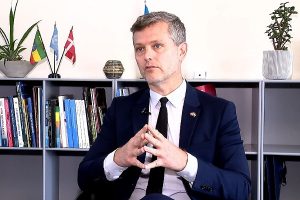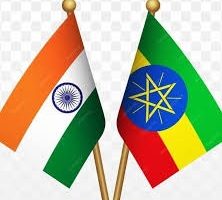
BY FITSUM GETACHEW
The OAU/AU is now sixty years old but how has it done during the past six decades? The AU may have acted as a place where all African leaders gather twice a year and at times even extraordinarily to talk about their problems to try and find a solution. But critics say it has more often served as a place where the African leaders gather and just talk instead of producing concrete solutions that would help the people of Africa improve their livelihoods. Concrete actions have been lacking while lots of statements and resolutions have been the order of the years.
The OAU/AU is now sixty years old but how has it done during the past six decades? The AU may have acted as a place where all African leaders gather twice a year and at times even extraordinarily to talk about their problems to try and find a solution. But critics say it has more often served as a place where the African leaders gather and just talk instead of producing concrete solutions that would help the people of Africa improve their livelihoods. Concrete actions have been lacking while lots of statements and resolutions have been the order of the years.
Critics of the AU say the organization is a ‘gathering of dictators’ who just gather every now and then and just have a talk between themselves without producing anything tangible and worthwhile for the poor people of Africa. They say a lot of the masses of Africans have not improved because of the existence of the AU, nor has the AU represented Africa as it should in the international sphere and about concrete solutions to African problems.
These people consider the AU just as a formal body that exists only in name and does not exert any tangible influence in the international sphere. No one considers the AU as a solid and powerful body that can exert real power or influence on the international diplomatic and political or military world where major international affairs are discussed and settled or drafted and implemented. These critics continue this is so because first of all the AU does not have enough resources to exist and operate by itself because it is always seen lacking the means, the financial resources to cover the costs of its operations and programs. It has been forced to rely on largely western donors and lately others such as China and Japan or the US with their specific programs with Africa.
It has never been an independent body capable of passing and applying its own decisions on matters that may affect the continent as a whole. For instance when it tries to influence the single African nations where democracy has been at risk or when there are cases of animosities between states in Africa that could expand to other nations and even threaten to destabilize the continent, it has often run out of resources and it had to resort to the purses of the developed nations to help it. The AU in the final analysis is a body constituted by fifty five nations none of which has a major economic muscle in the larger world. The budget of the AU is so vast that it could not be fulfilled with only the member states’ contribution and at times some member countries have not been able to pay their contribution to run the body in time.
We have seen lately that China has been a major supporter of the AU and it has been contributing to the economy of African states. It has presented the new premises of the headquarters of the AU in Addis Ababa in a huge complex as a token for the China-Africa close relations. This means that the organization is inevitably influenced by these forces preventing it to adopt its own decisions independently and freely. You cannot ask for assistance and be able to adopt the decisions you want to disregarding may be the suggestions of your donors. Hence many have come to characterize the AU as a lame duck in terms of autonomy of action.
What is more, even African leaders themselves often do not respect the resolutions and decisions of the AU if it does not fit their agenda or objectives. The AU needs stronger muscles to deserve the respect of its own member states. The statements made by the AU need to deserve more heeding and respect and be obeyed considering the recommendations and suggestions forwarded by the continental body. The credibility and prestige of the AU must be enhanced if it is to be an effective organization that produces good results when there are continental agendas presented to it. If every member does not feel the pressure to respect the declarations of the AU and gets away with a rejection, the influence and acceptance of the organization could risk to diminish to alarming levels and its acceptance in the international sphere as well get affected negatively.
A body that is not respected even by its own members could not hope to be respected or taken seriously by outside forces. Recently, there have been requests of the AU to be represented in the major international conferences but we have not seen that happen. The continent of Africa is not represented at the United Nations Security Council as a permanent member. The UN SC continues to be antiquated body that still reflects the international order existing in the immediate post World War II era. How can 1.3 billion people remain out of the UN Security Council where there are countries such as France and England with about sixty million people each?.
This is one of the key questions the international body has not been able to address even admitting its flaws and the need to reform the world body to make it reflect the actual tangible reality of the geopolitical condition of the world. There has been continuous pressure on the world body to consider seriously this fact and it has gained the serious attention of many powerful countries. The world body cannot be complete without including Africans in its international deliberations or decide on Africans without even considering hearing their views.
This has been unfair and unjust and the AU must work hard to straighten this injustice. A strong AU could fairly exert the influence it takes to change things in the right direction. In sixty years the AU has made little progress in this respect. It has not raised its voice loud enough to be given the necessary attention and this has hurt the stance of Africa in the international arena where things are decided without bothering to consult Africans.
We all agree that Africa has immense natural resources without which the economy of the most advanced countries would be in deep trouble but its inhabitants still languish in abject poverty because they do not get the right value for their resources and labor in the international market. Raw materials are transported to the outside world at ridiculously cheap prices and the lot of those who actually produce cannot improve their lives.
Africa cannot continue to be bluntly exploited of its natural resources and does not have what it deserves in return. If the AU does not have the necessary muscles to exert its influence in the international trade and economic transactions, what is the concrete use of the AU? Moreover, if the AU does not manage to expand democracy in the single member countries by sanctioning those who resort to coup d’etats and other illegal and unconstitutional means to acquire power or maintain power and condemn dictators, or expose violations of basic human rights against innocent populations in the member states, what is the value or relevance of the AU for Africans?
Its mere existence does not serve the ordinary African citizen who is at the receiving end of all these injustices and unfair practices. Many ask will it take another sixty years to be able to solve some of the fundamental issues of Africans. When the continental body was first founded there was hope that this body would be of tangible help to improve the lot of Africans because this body would be a positive influence on the leaders of the member states. Africa would have a strong say in the international sphere, it was hoped. African leaders would also listen more to their citizens and constituencies and together with other member states work together and produce good results.
Economic integration was one of the major agendas of the AU because Africans never exchanged trade between themselves and in fact they trade more with distant European countries particularly with their old patrons. This state of affairs was intended to be changed by expanding close relations with neighbors. Now with the AfCFTA this dream may be approaching to be a reality as all Africans are embraced in a continental free trade area.
True, Africa is suffering from immense security, good governance, economic and other challenges and they may be beyond the capacity and even scope of responsibilities of the AU. But it is difficult to say that this body has done effectively what it should have done and member states must accord it the necessary attention and respect to the body in its drive to iron out certain problems of the continent, especially with respect to its relations with foreign powers. Africa can only exert more influence and be heard better only if it acts as one and speaks loud with one voice. That is why the prestige of the AU matters a lot. It is something on which all member states must work hard. The AU needs to be heard and heeded first of all among its constituent states and then it can hope to have some more influence in the outside world.
In a continuously changing geopolitical situation Africans must make the best of the AU to adopt a common and fruitful stand for its members and not get disintegrated along certain lines that is a pleasure to the outside world. A united Africa would certainly obtain the place it deserves in the international arena and that is where the AU must be more active than ever. The AU must assess its sixty year journey and try to rectify where it has failed and strengthen the positions where it has got good results.
THE ETHIOPIAN HERALD TUESDAY 30 MAY 2023




